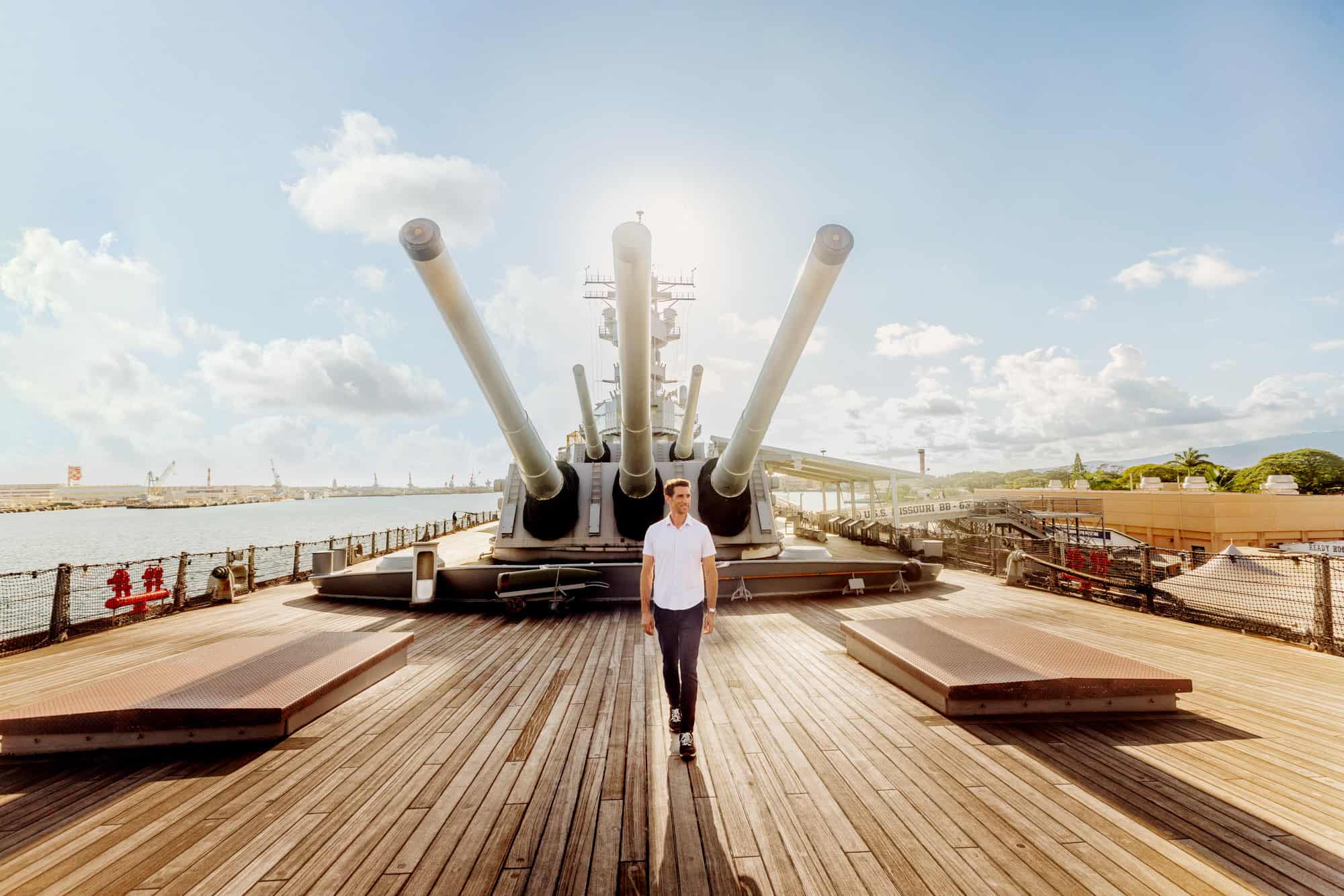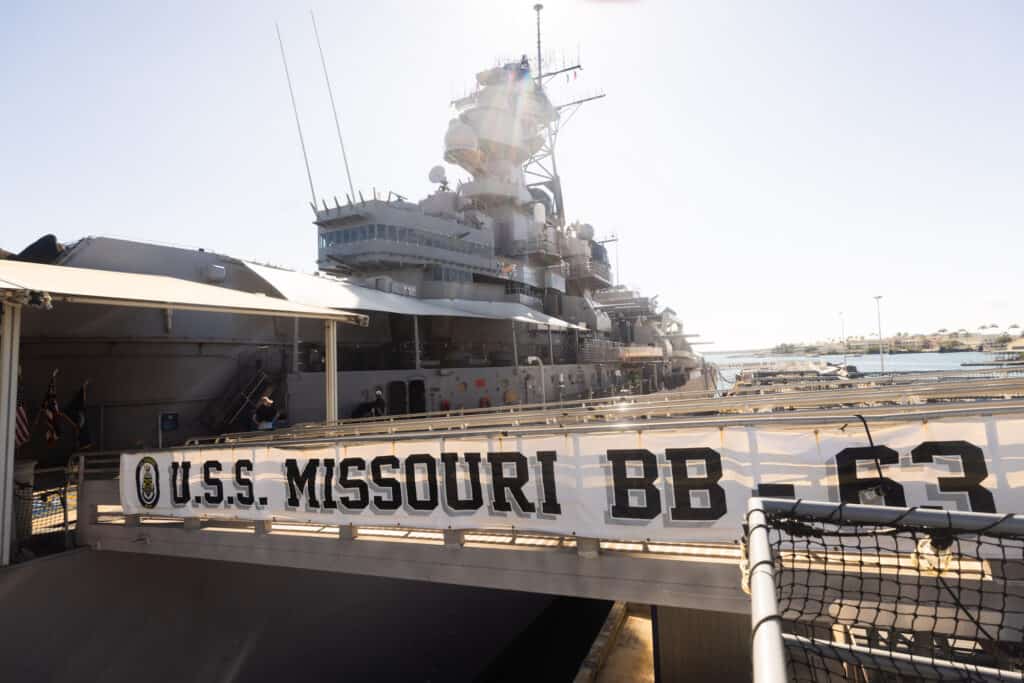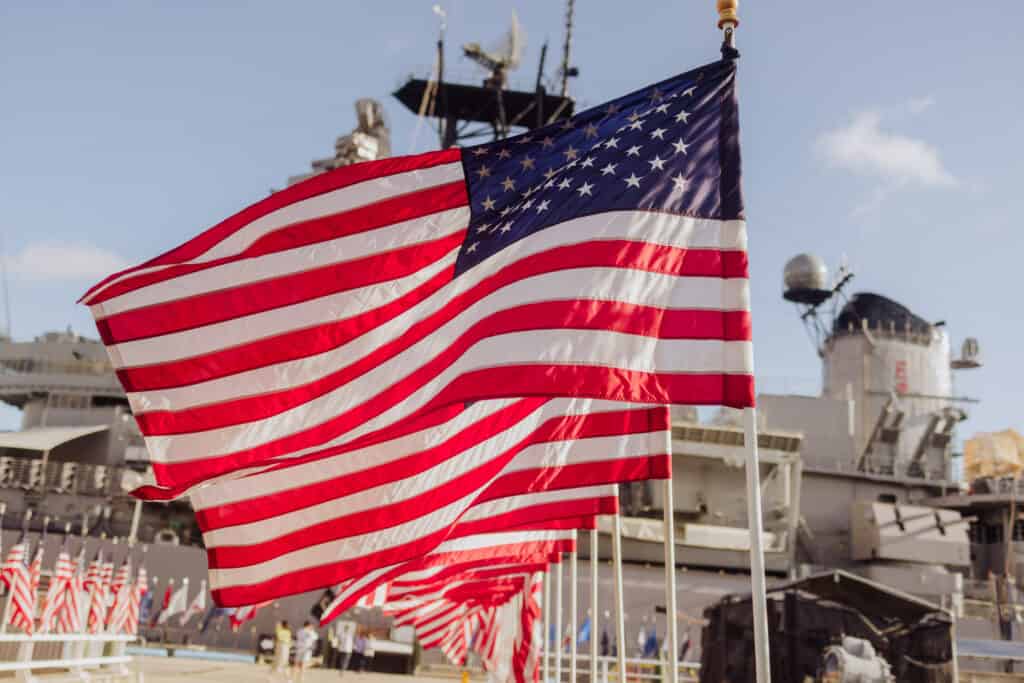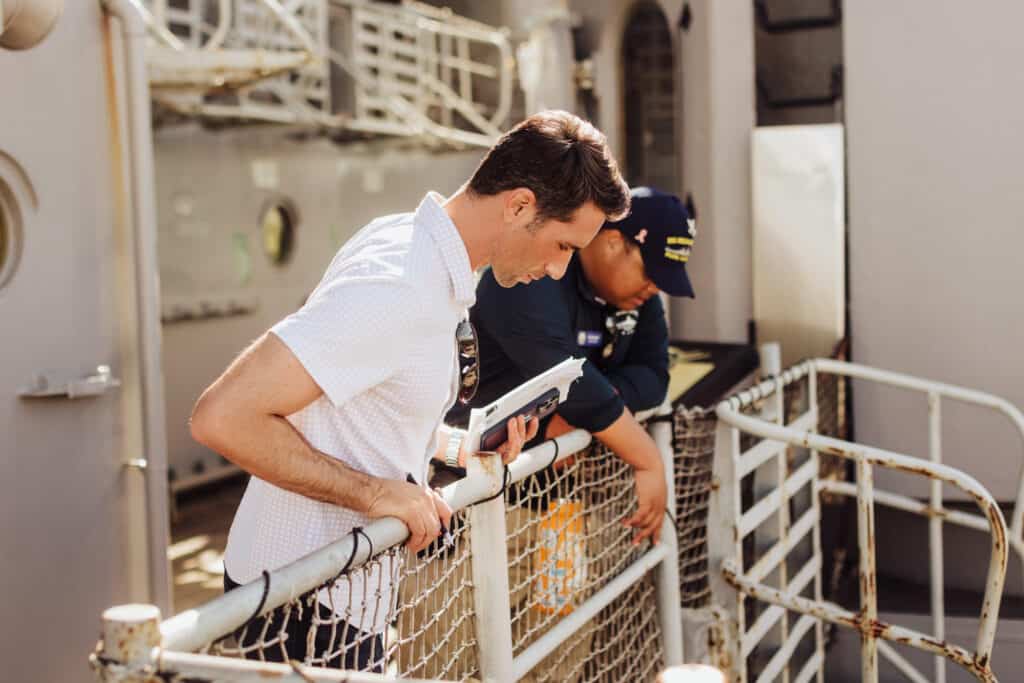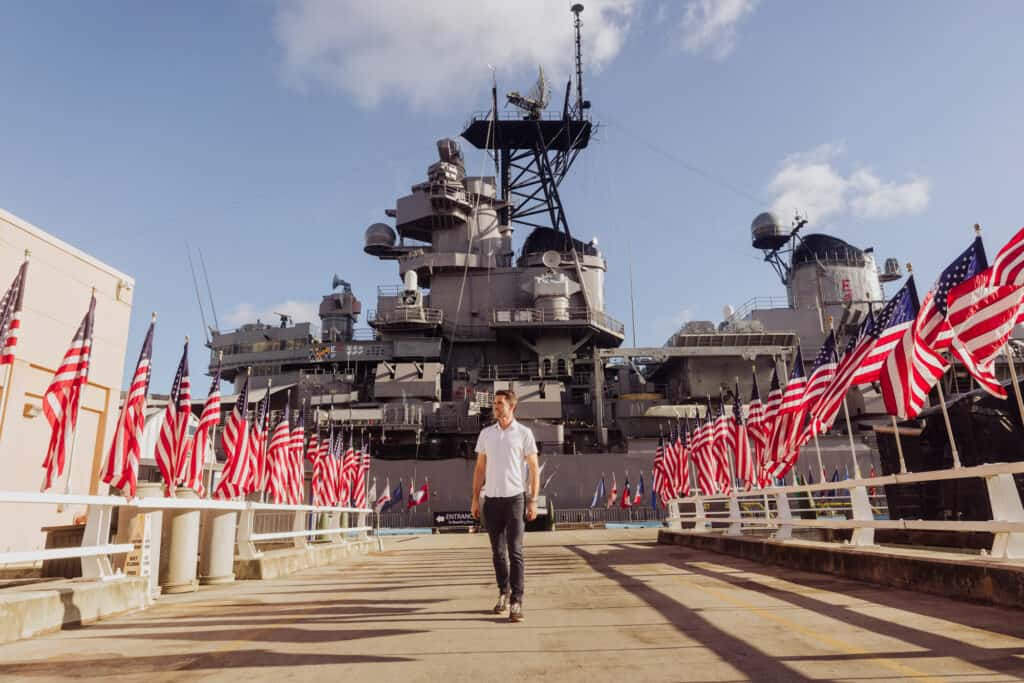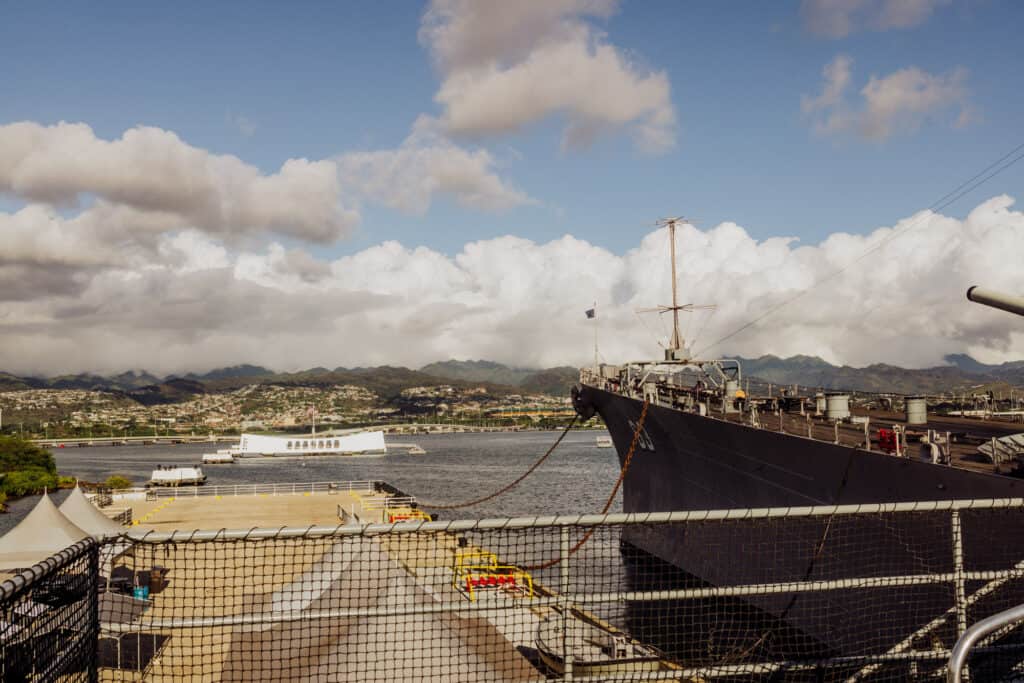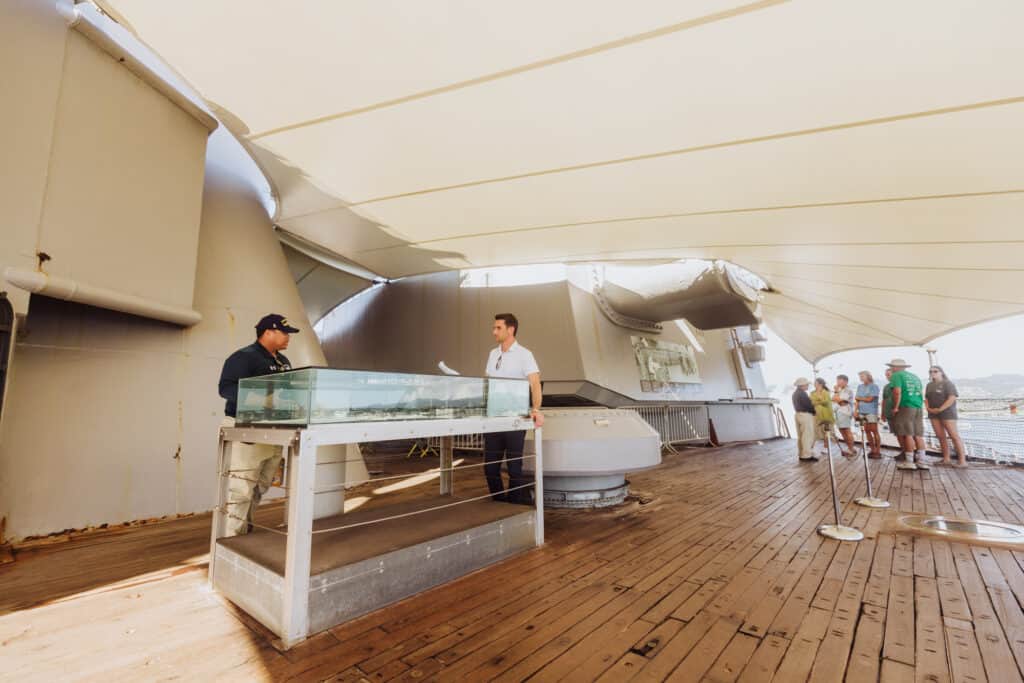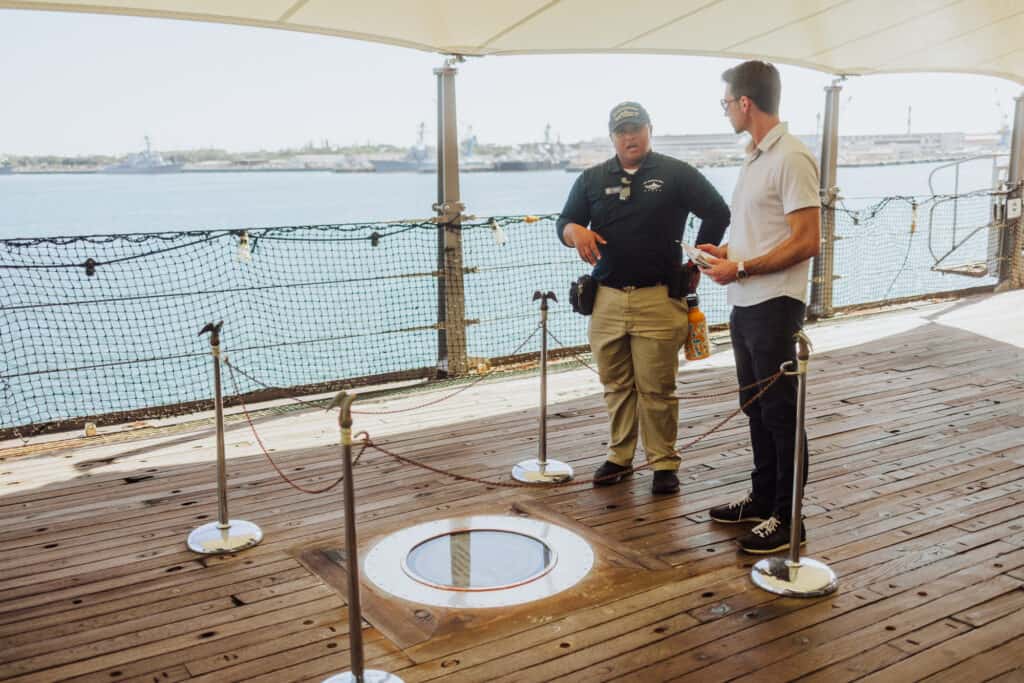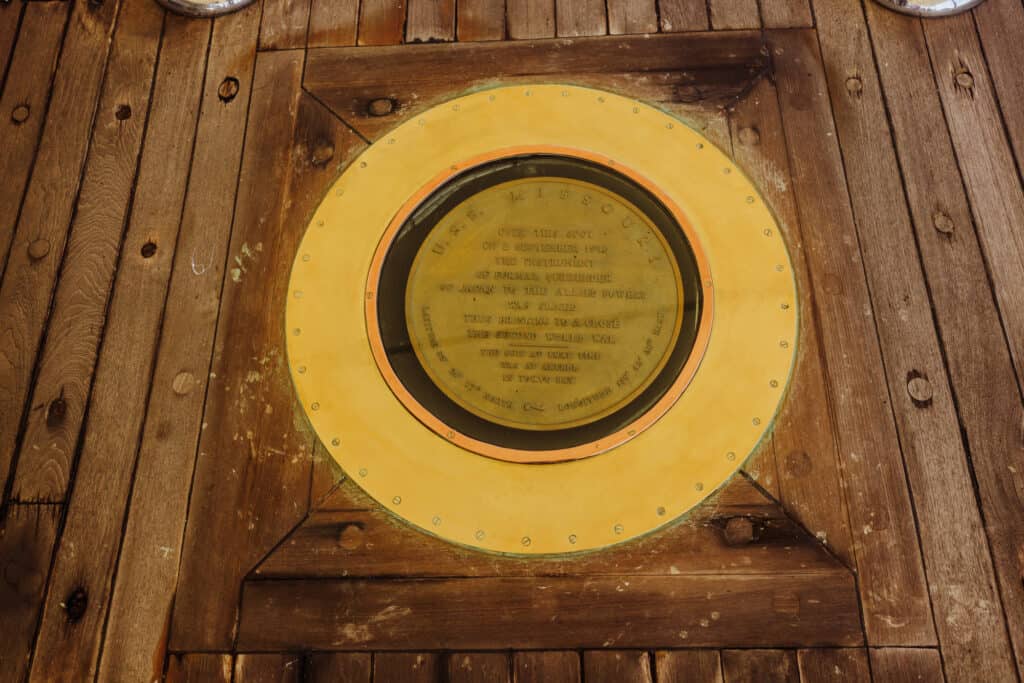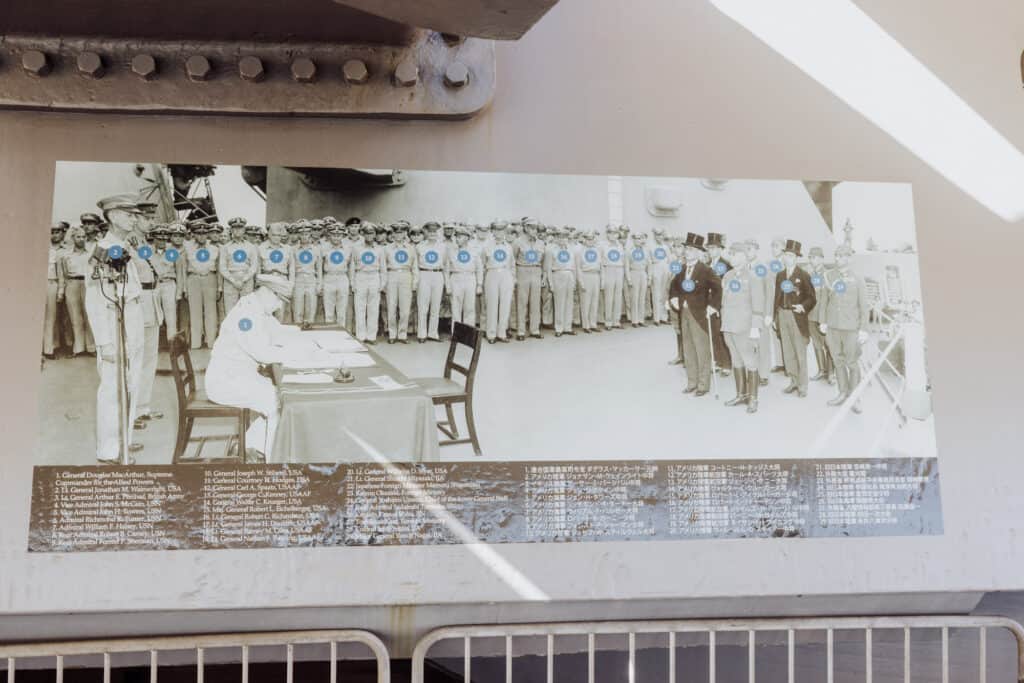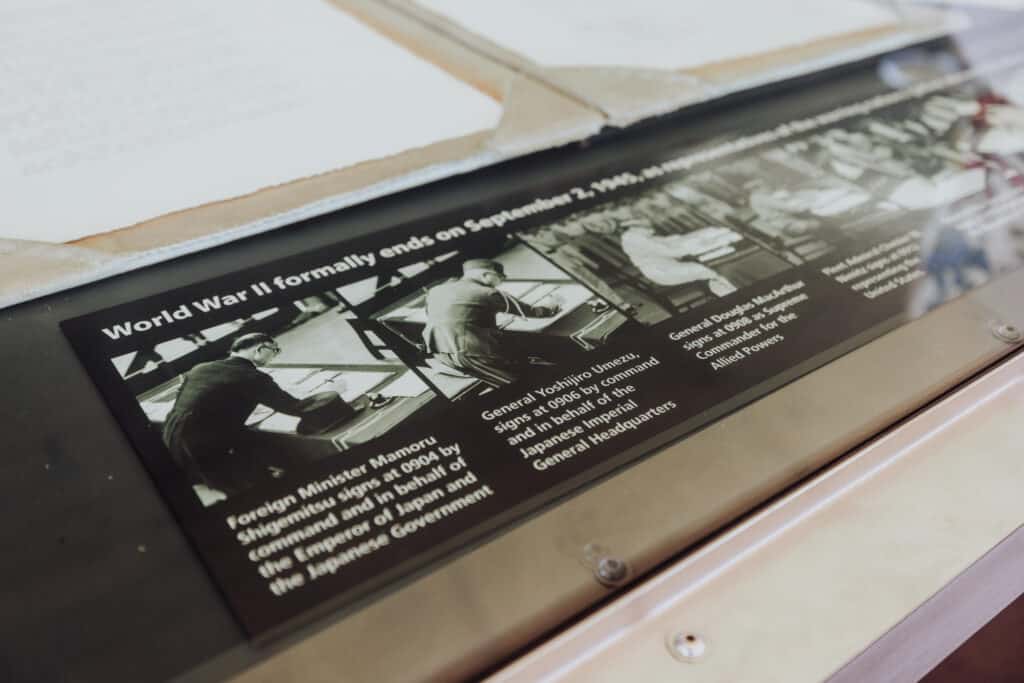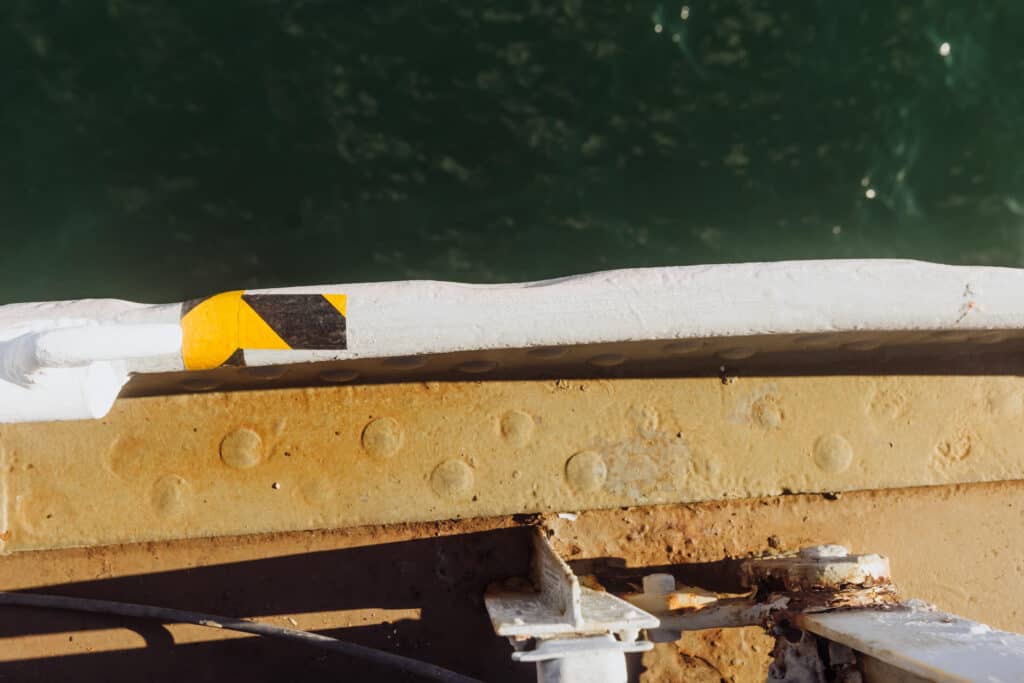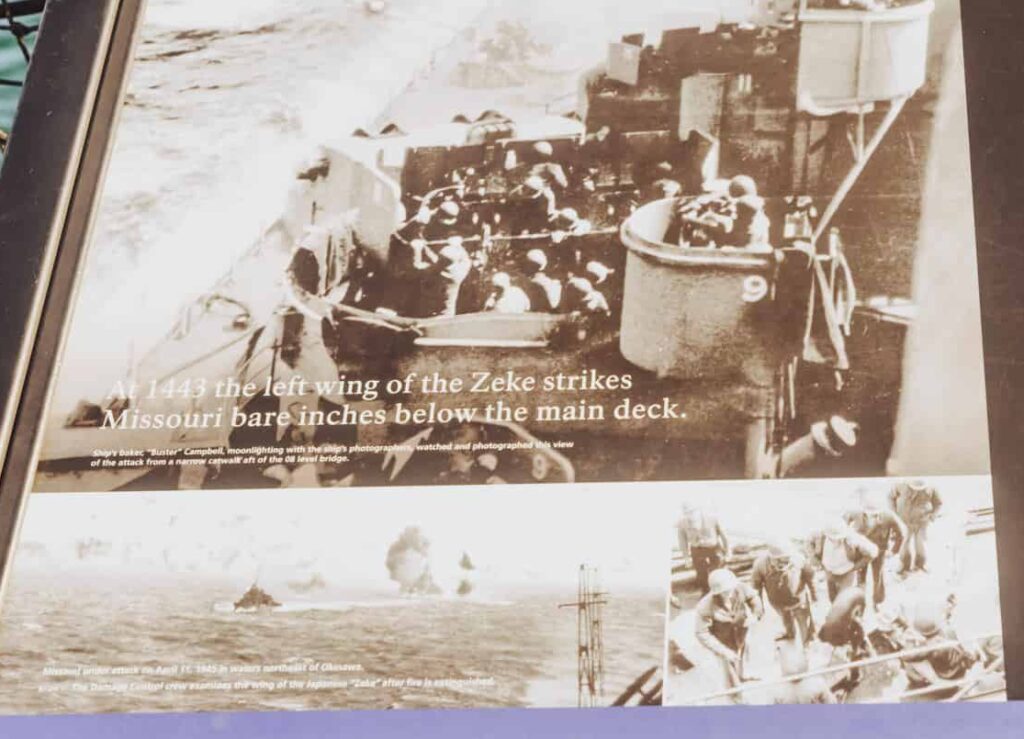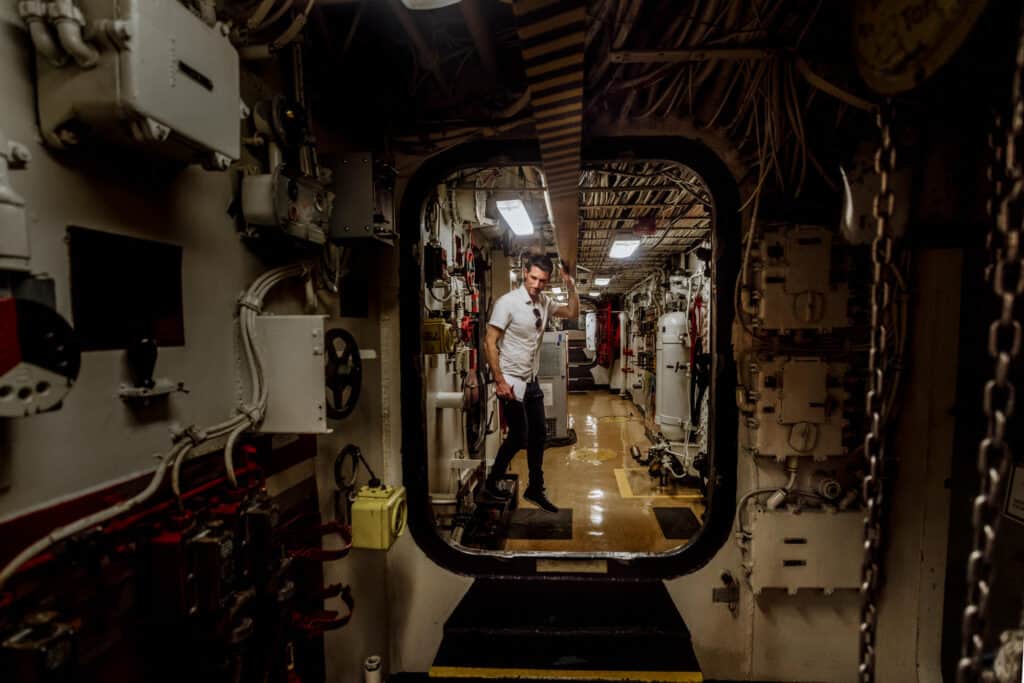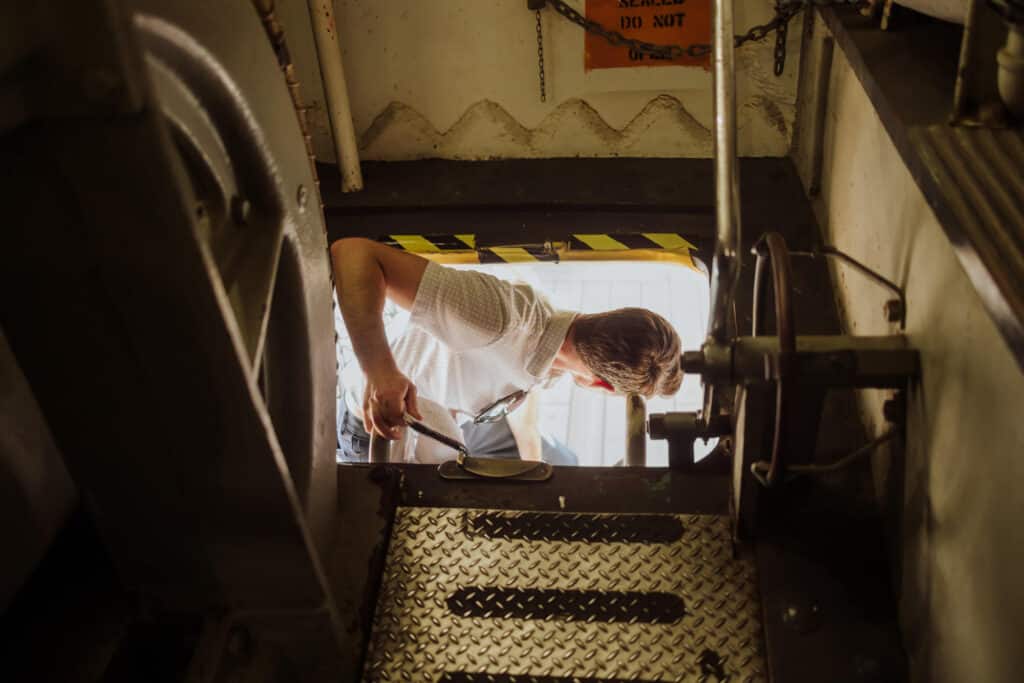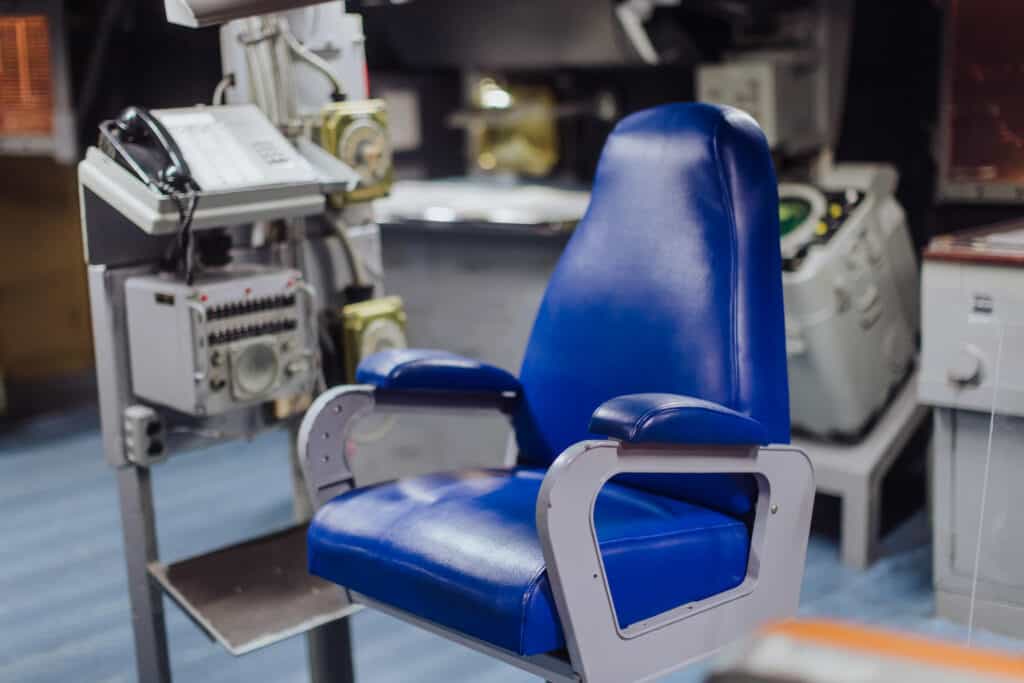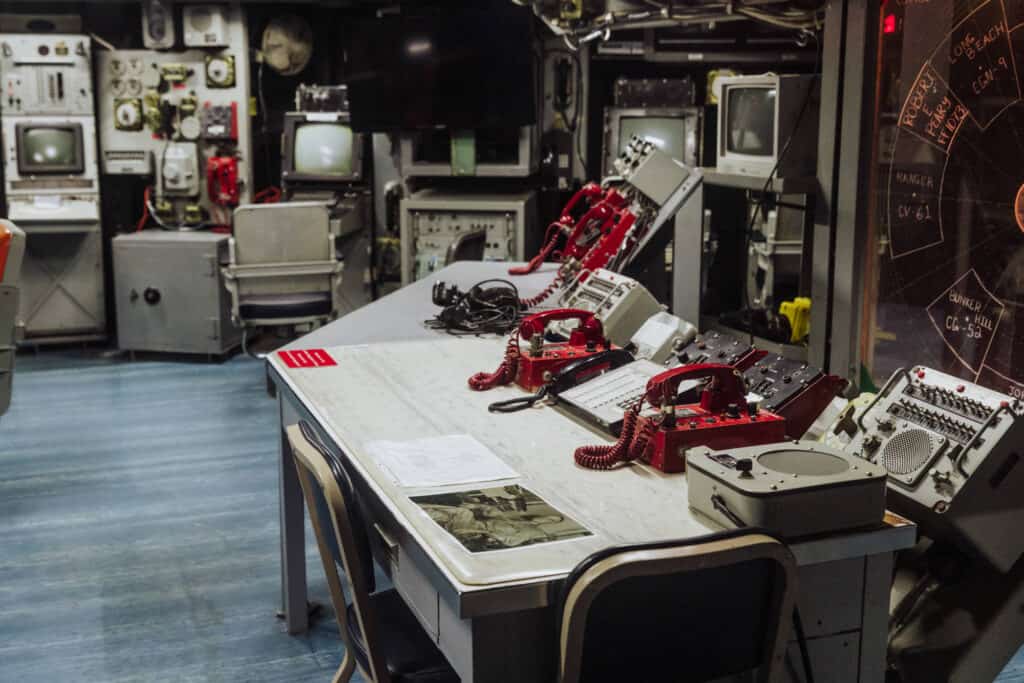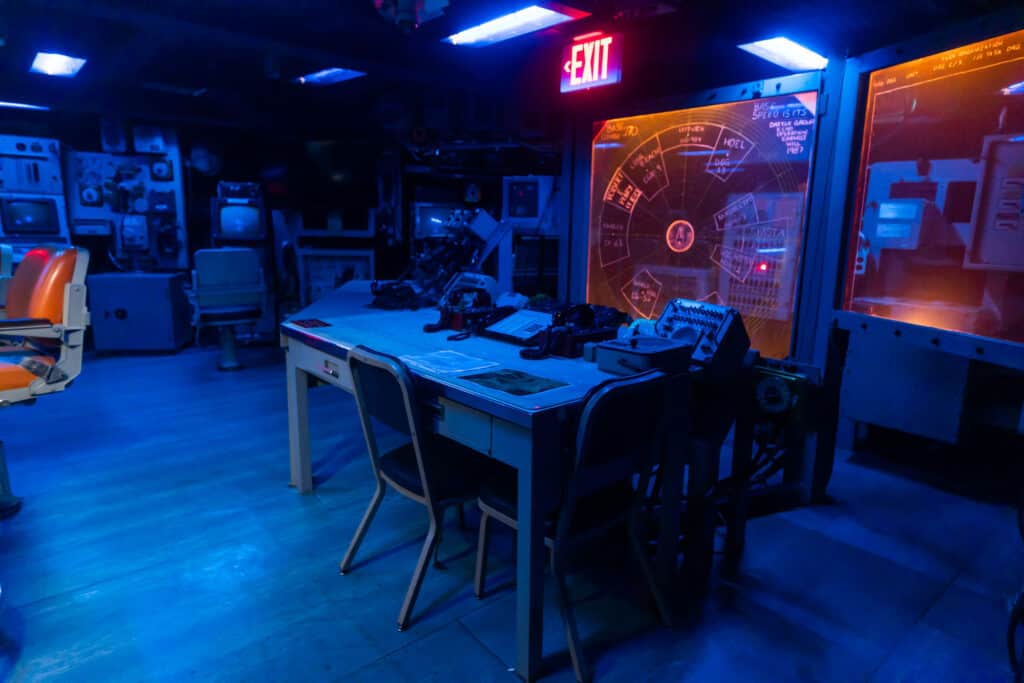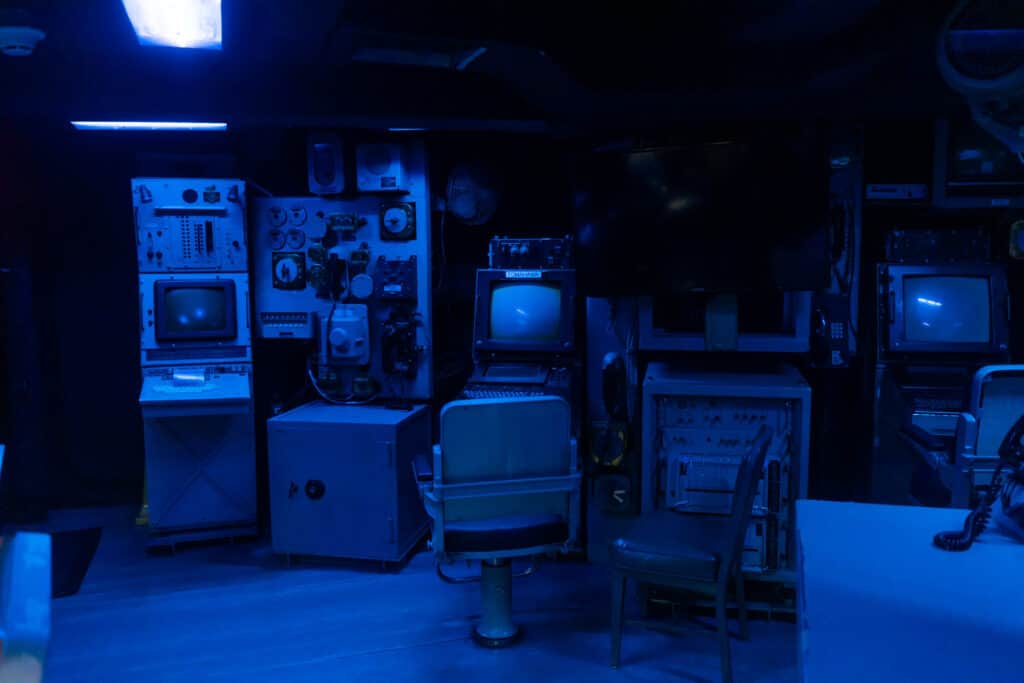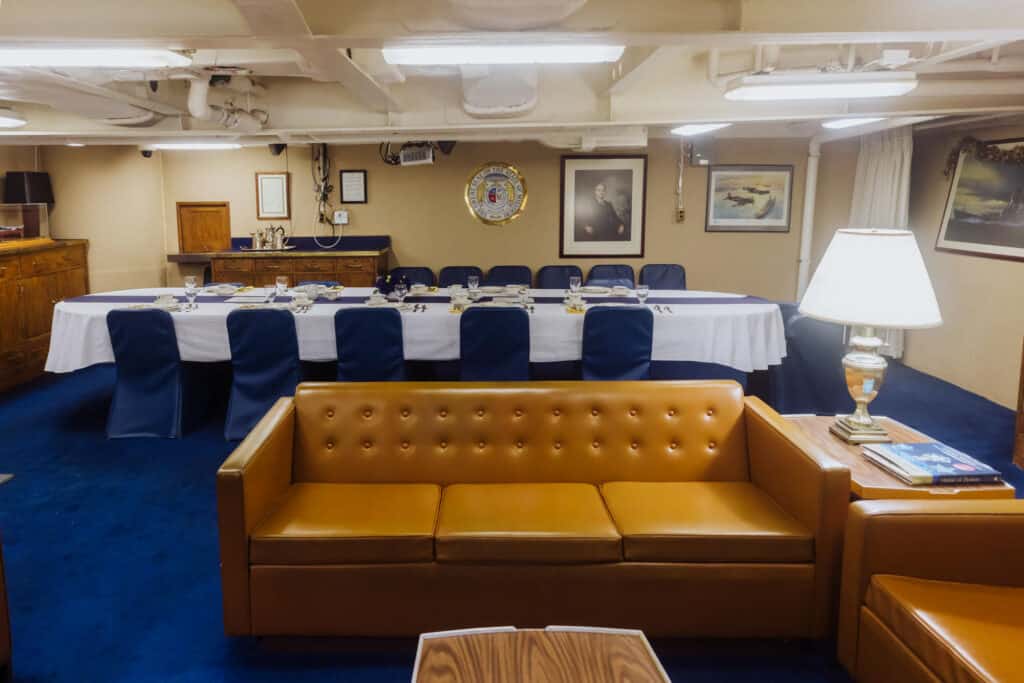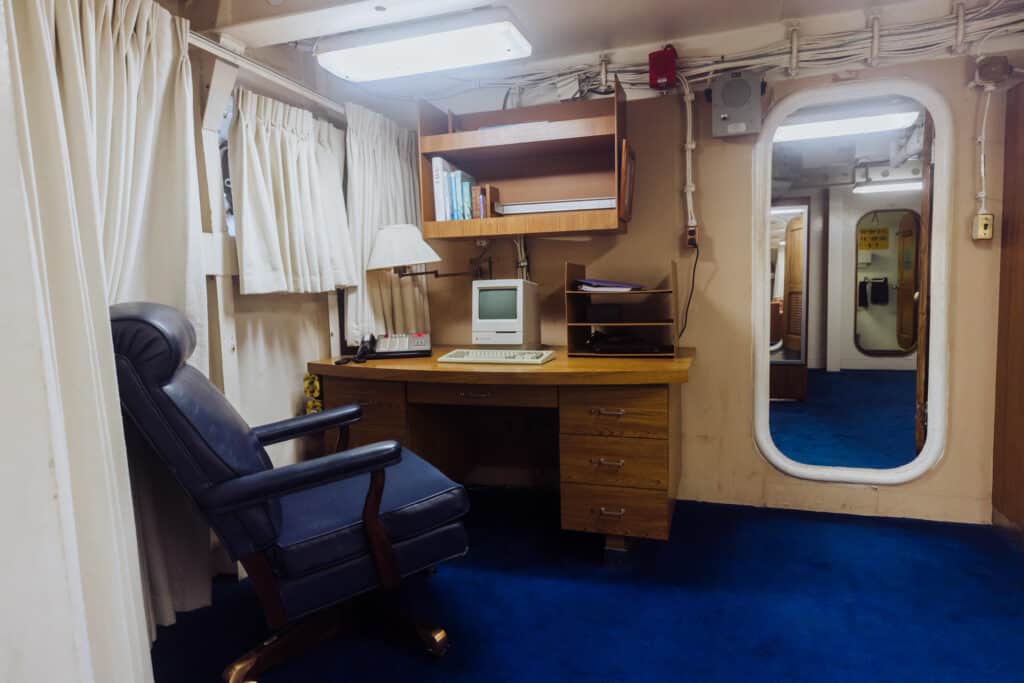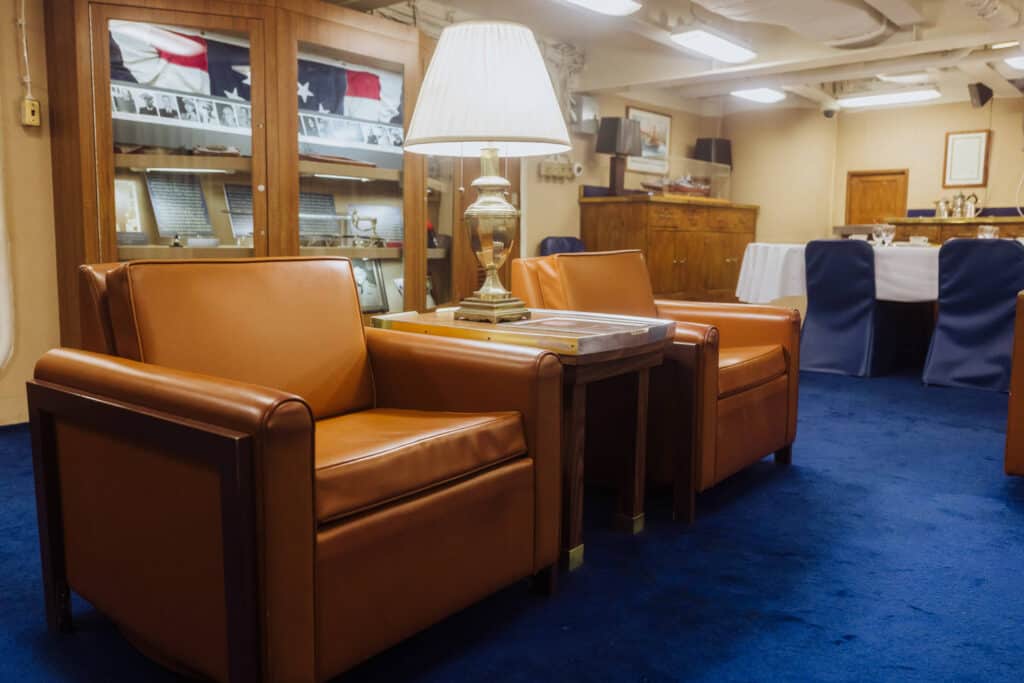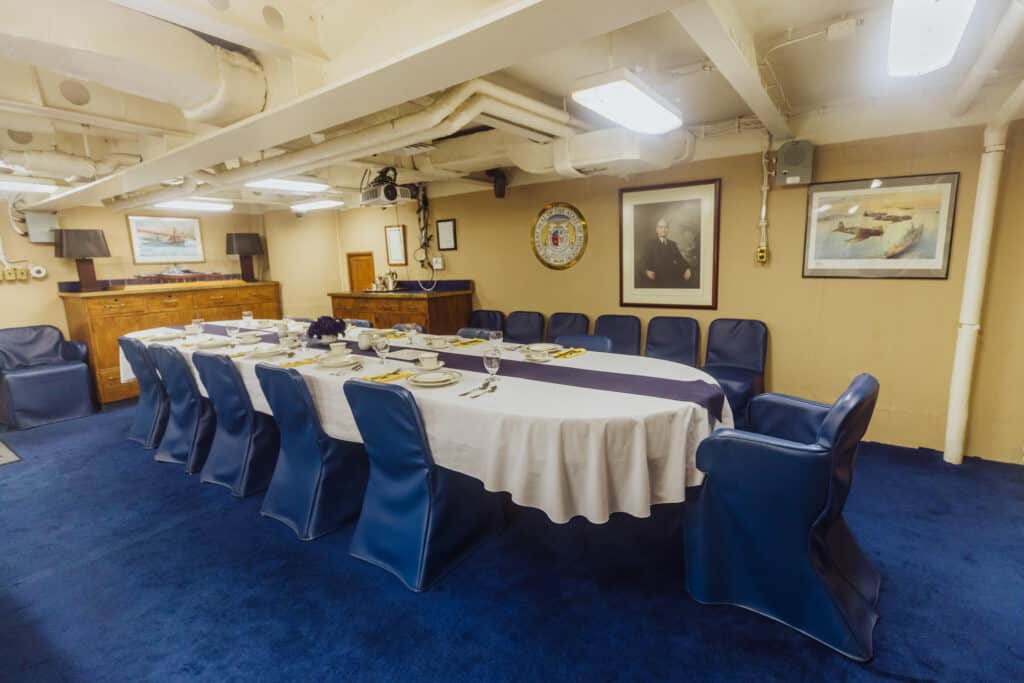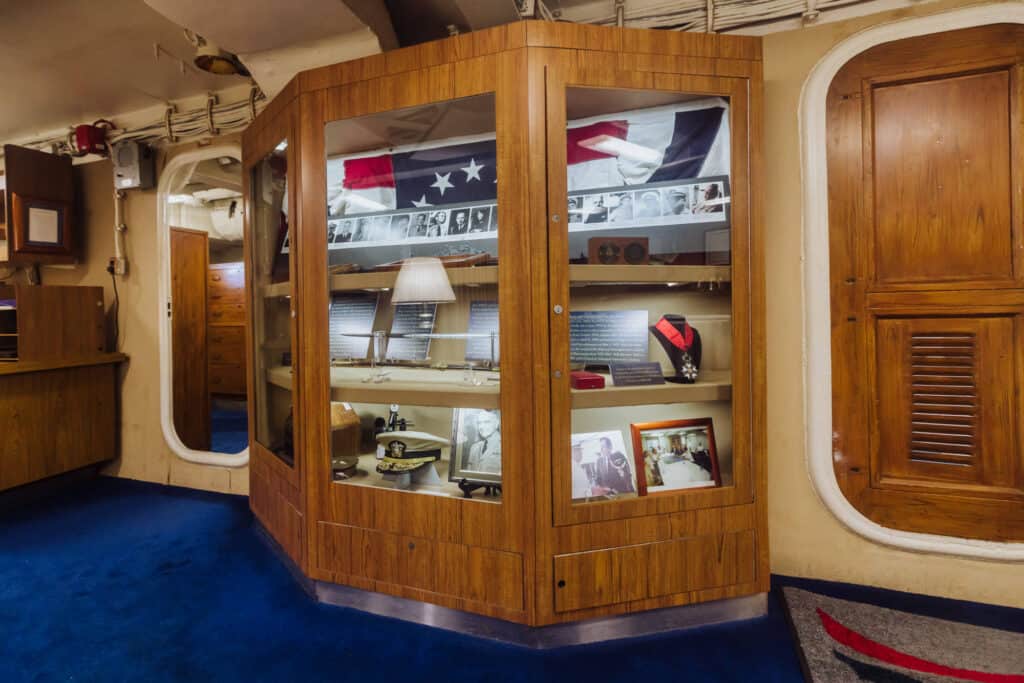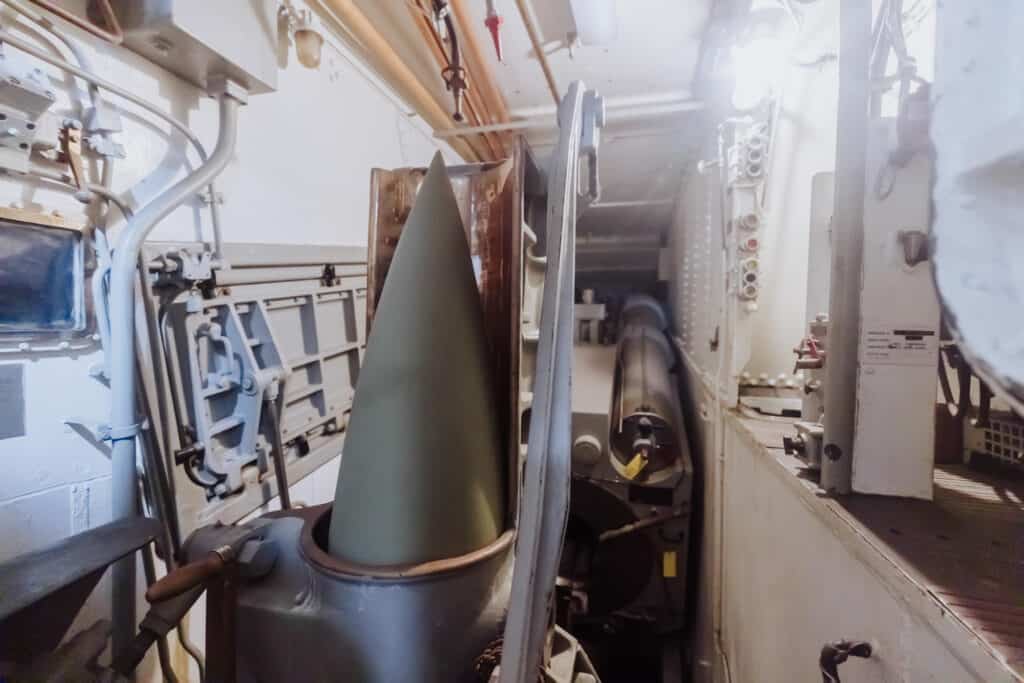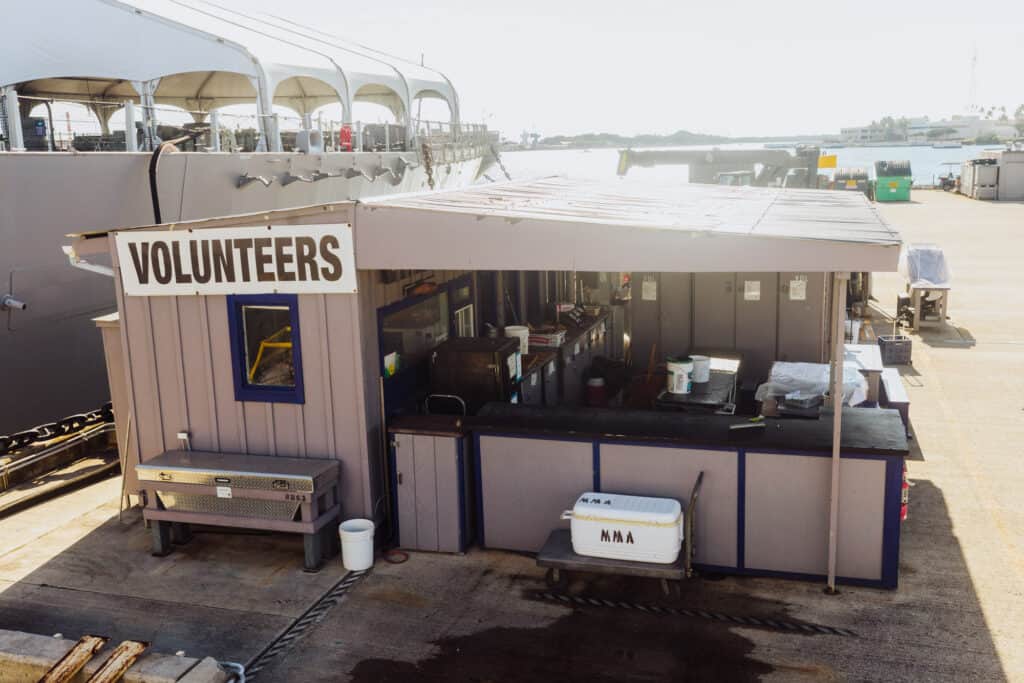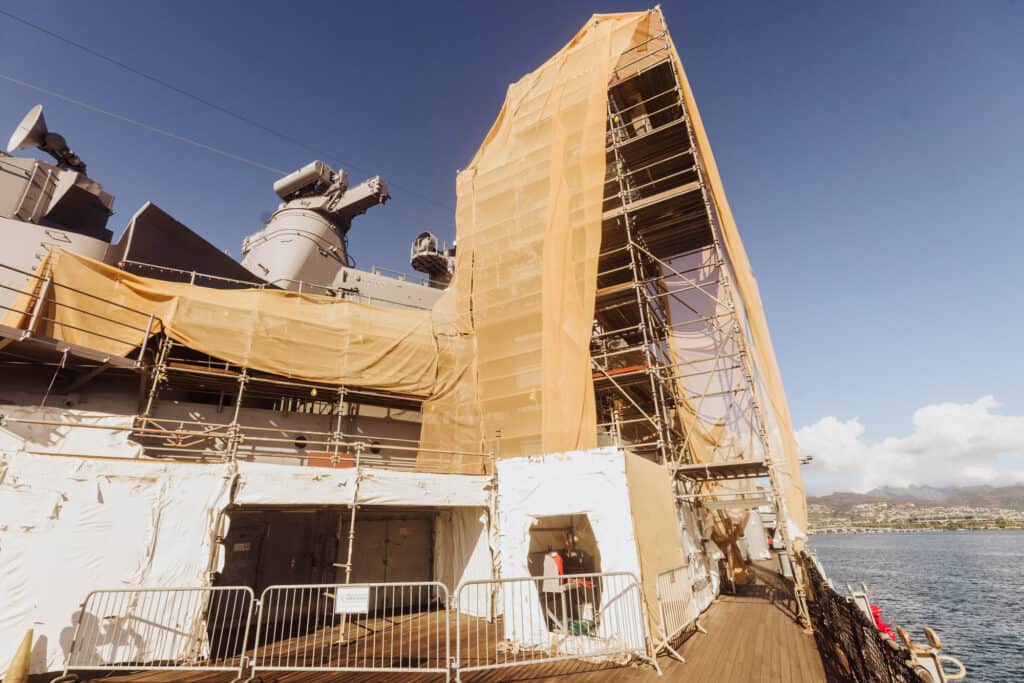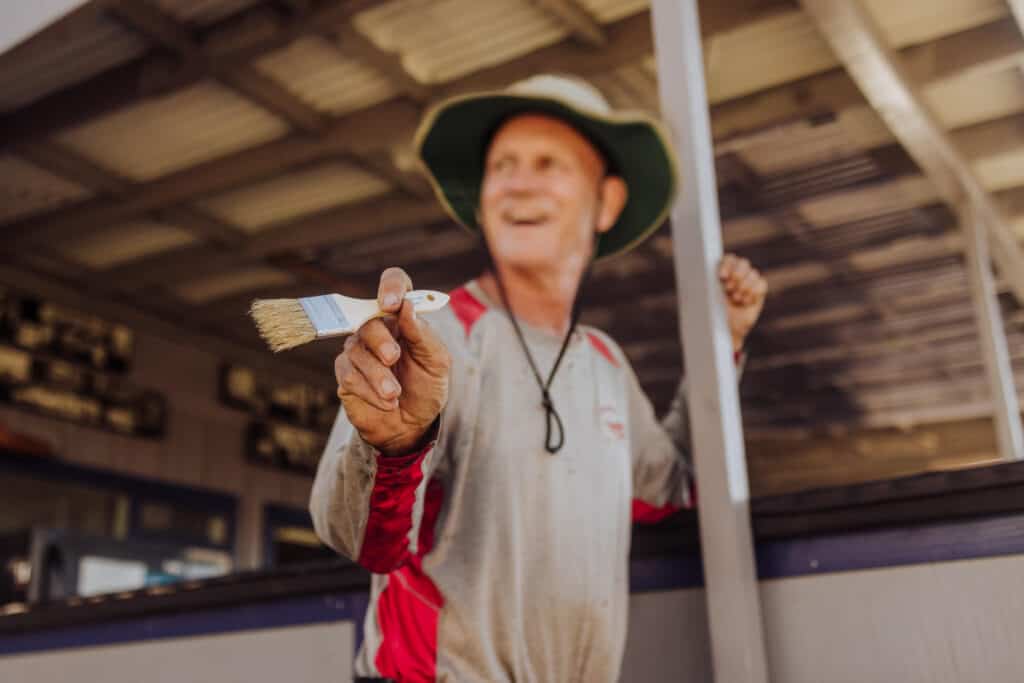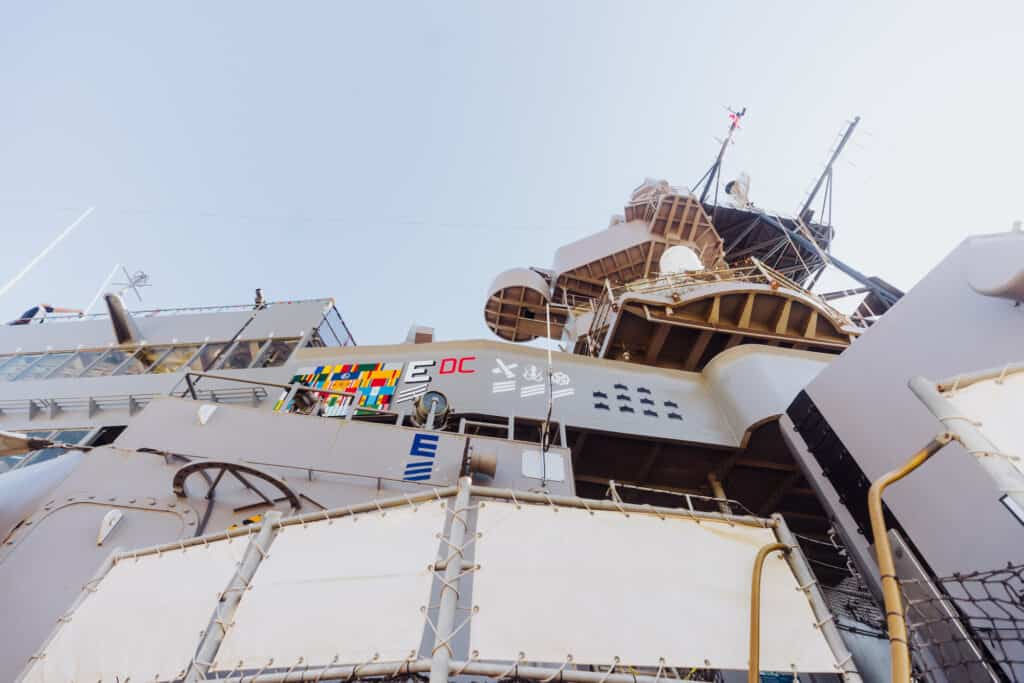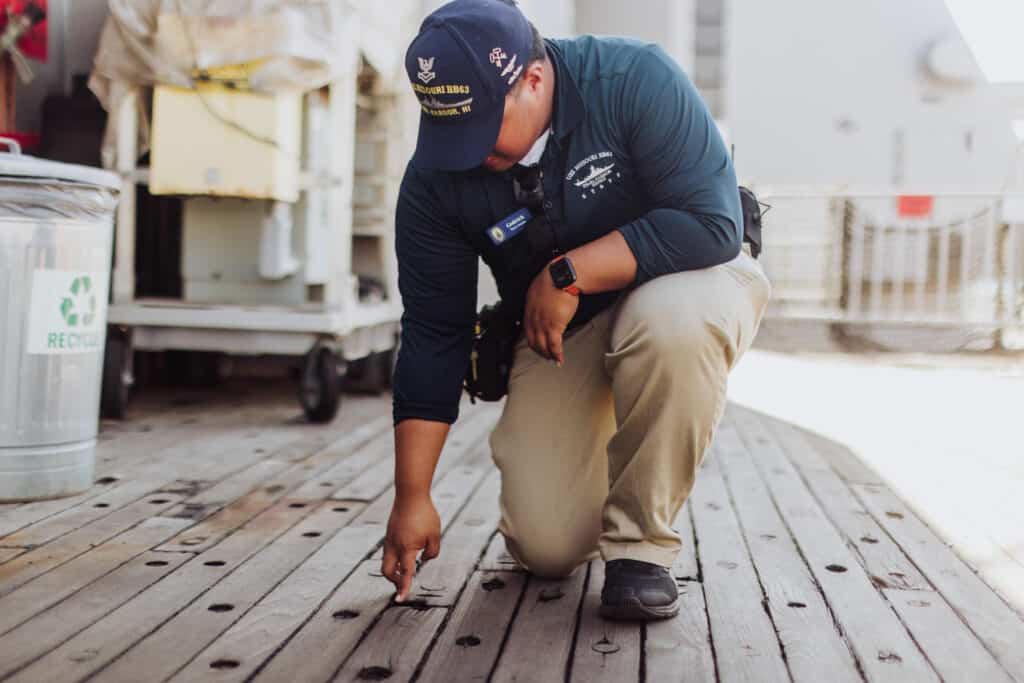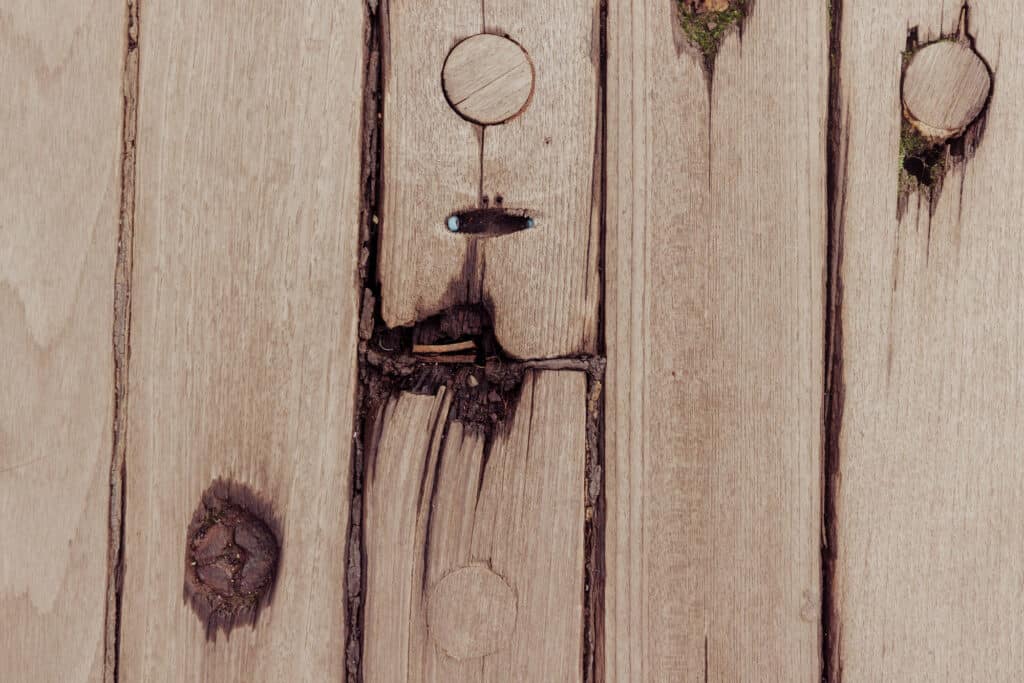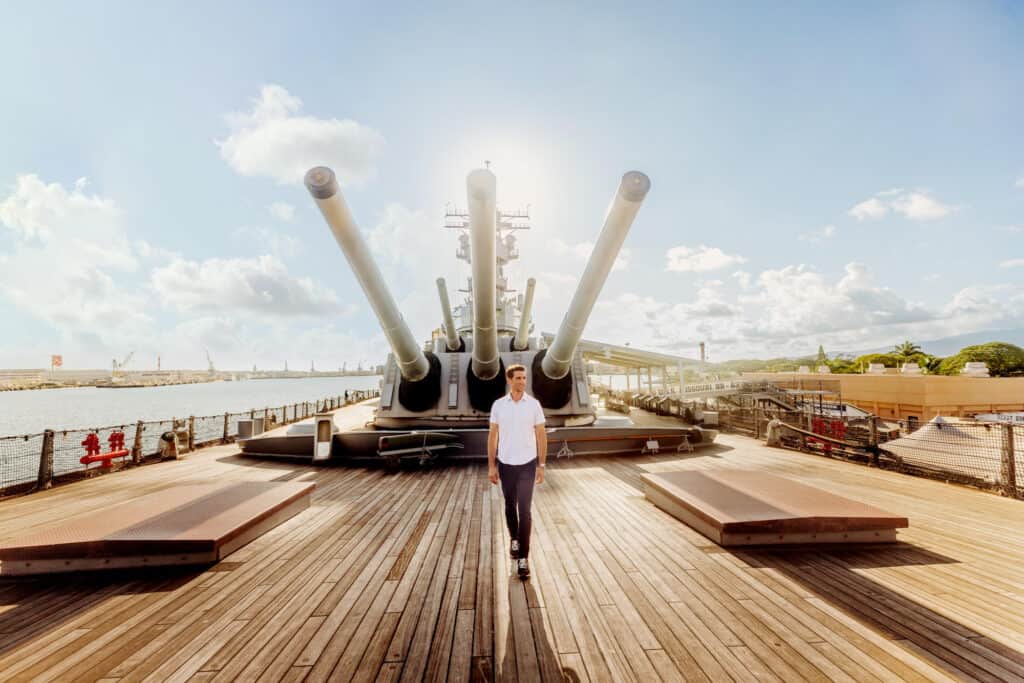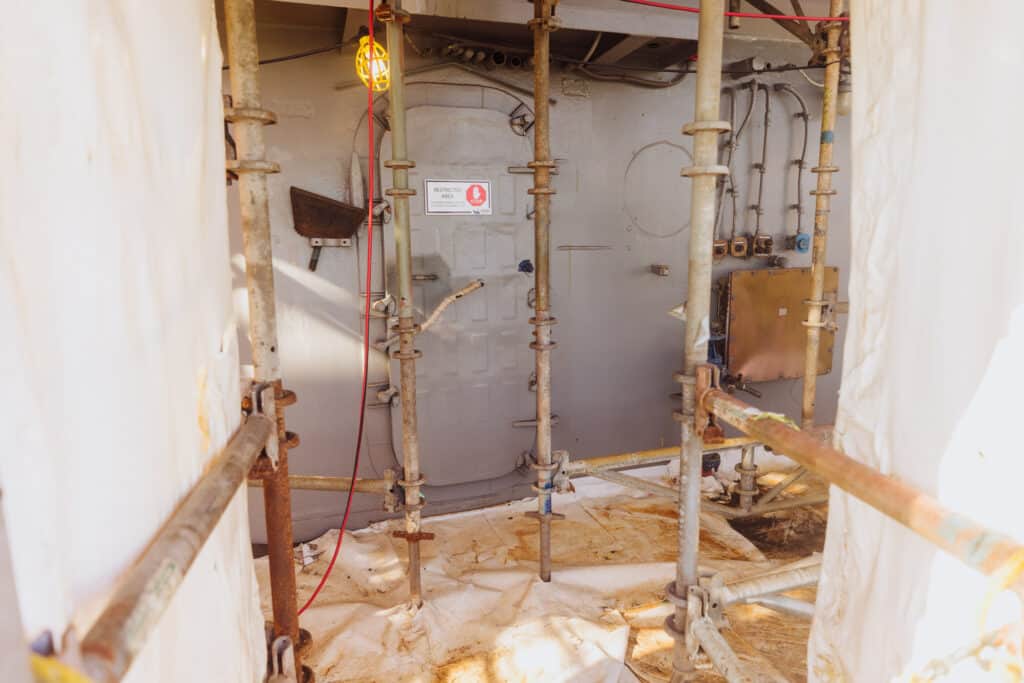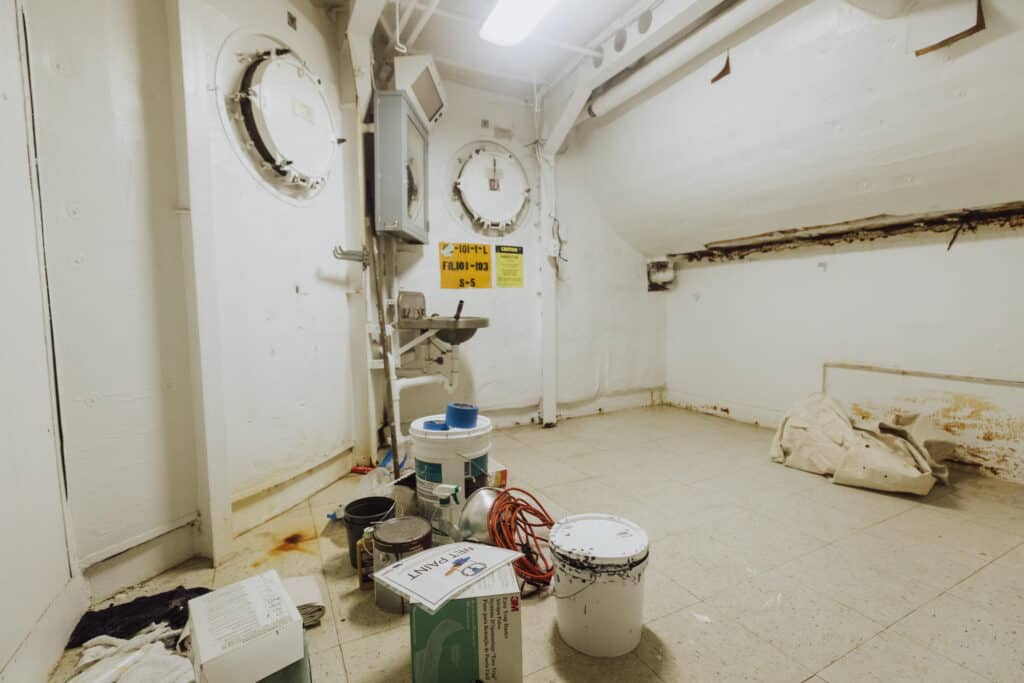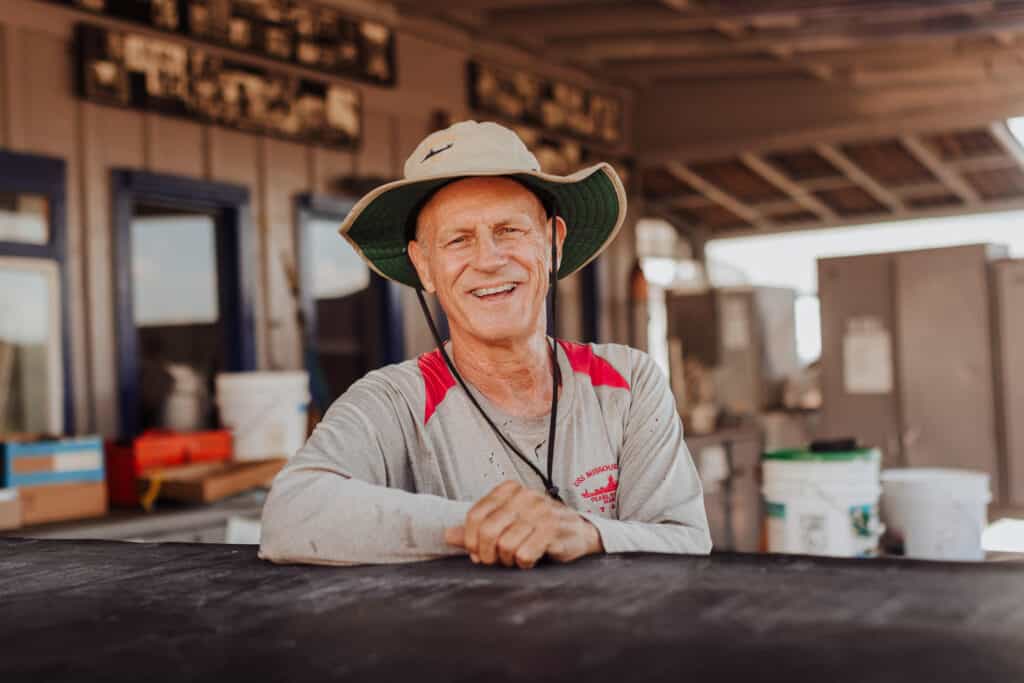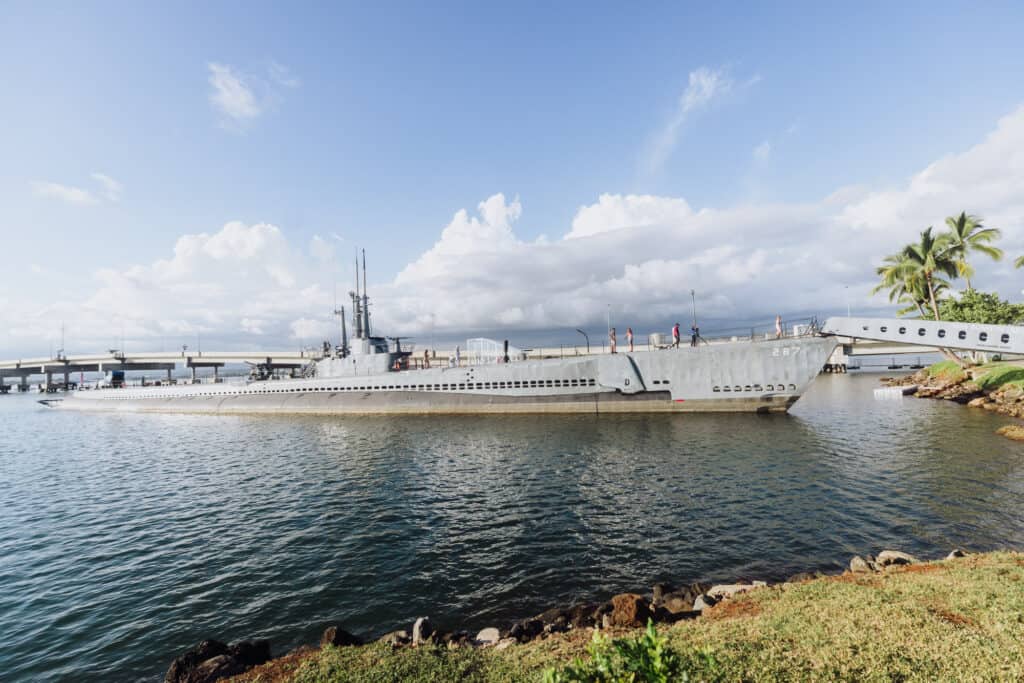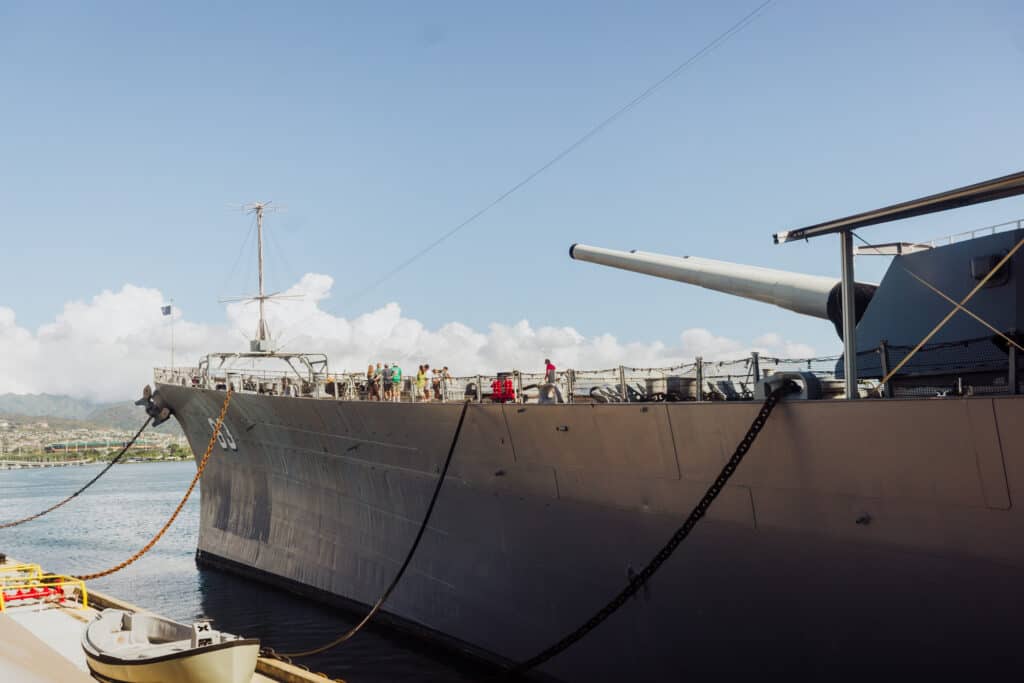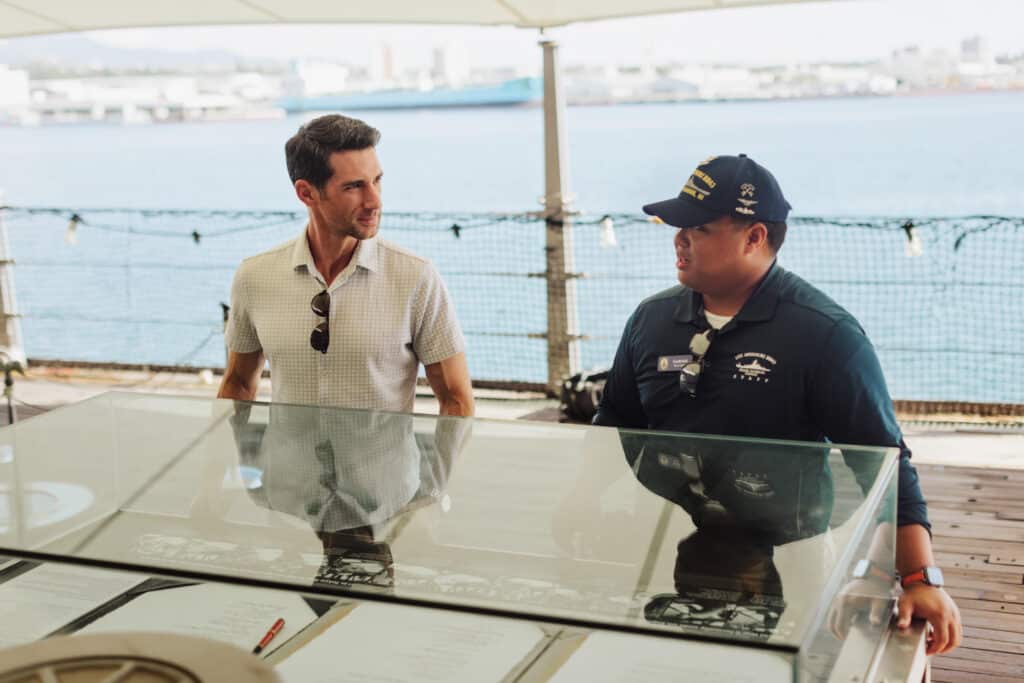Visit the USS Missouri at Pearl Harbor: Tours & Volunteer Work
Pearl Harbor is the final resting place for many ships that played important roles in American History, including the USS Missouri, a Navy battleship built in the 1940s.
Battleship Missouri, known as the “Mighty Mo,” is now a floating museum which provides a truly unique visitor experience!
KEY TAKEAWAYS on the BATTLESHIP
The USS Missouri is perhaps best known as the site of the Japanese surrender at the end of World War II. On September 2, 1945, the Japanese delegation signed the Instrument of Surrender aboard the Missouri, officially bringing an end to the war.
On a visit to the battleship, now permanently docked at Pearl Harbor, you’ll learn about its role in other conflicts, including the Korean War and the Gulf War. Plus you have the unique opportunity to volunteer on various restoration projects onboard.
Battleship Missouri Tours and Tickets
The Battleship Missouri Memorial at Pearl Harbor offers a variety of tour options. I’ll describe what you’ll see onboard as part of the different tours down below. Here are the options and prices:
- General admission for adults: $34.99
- General admission for children(4-12): $17.49
- Captain’s Tour: $65
- Chief Engineer’s Tour: $65
- Passport to Pearl Harbor: $90
The memorial is open daily, from 8:00am – 4:00pm, with the last admission allowed at 3:00pm.
USS Missouri & Pearl Harbor Tours from Waikiki
There are a variety of other tours from Waikiki offered to Pearl Harbor and the USS Missouri. Here are several options, in case one is booked for your dates. They have excellent reviews:
➡️ Tour of Pearl Harbor from Waikiki [CLICK for details]
- This 7-hour tour for history buffs includes pickup in Waikiki, plus skip-the-line admission to the USS Missouri and USS Arizona Memorial.
➡️ Pearl Harbor Passport from Waikiki [CLICK for details]
- This full-day tour begins with a pickup at your hotel in Waikiki. You’ll skip-the-line to visit the USS Arizona Memorial, the USS Missouri, the USS Bowfin Submarine, and the Pearl Harbor Aviation Museum.
A Visit to the USS Missouri at Pearl Harbor
The USS Missouri was decommissioned in 1992 and eventually turned into a museum ship, which is open to the public. On different tours, visitors can explore the ship’s decks, living quarters, combat engagement center, captain’s quarters, and more to learn about the ship’s history in service.
Where is the Battleship Missouri Memorial?
The Battleship Missouri and the Pearl Harbor Aviation Museum are on Ford Island, which is an active military base at Pearl Harbor. Here’s a map of Oahu, which you can click on to get a better sense of where exactly the Missouri is docked:
The Missouri is located near the USS Arizona Memorial, which honors the lives lost during the attack on Pearl Harbor on December 7, 1941. In fact, you can see the USS Arizona Memorial from the deck of the Missouri:
Shuttle to the Battleship Missouri Memorial
You can’t drive over the bridge to Ford Island on your own since it’s an active military base.
You’ll park at the Pearl Harbor Visitor Center, and take a bus over to Ford Island.
The shuttle is free with your admission, and they depart every 15-20 minutes or so. The buses run a loop, from the visitor center to the Battleship Missouri Memorial, then the Pearl Harbor Aviation Museum, then back to the center.
The shuttles begin running each morning at 8:00am, and the final bus leaves the Pearl Harbor Aviation Museum on Ford Island at 5:00pm.
Stand at the Site of the Japanese Surrender
The USS Missouri is perhaps most famous for its role in the Japanese surrender of World War II.
On September 2, 1945, the Japanese delegation led by Foreign Minister Mamoru Shigemitsu signed the Instrument of Surrender aboard the USS Missouri, officially bringing an end to the war.
It will definitely help to have one of the knowledgeable guides, like Cedrick Badua, along on your tour to point out all of the significant pieces of history onboard.
The Kamikaze attack on the USS Missouri
During World War II, and the Battle for Okinawa, 5,000 American sailors lost their lives in kamikaze attacks by Japanese pilots. The suicide missions sank 36 ships.
The USS Missouri was targeted on April 16, 1945, about 300 miles south of Okinawa. Radar picked up a Japanese plane, known as a Yokosuka D4Y “Judy” dive bomber heading for the battleship.
The plane hit just below the deck, killing the pilot. There were no casualties on the Missouri. While it resulted in some plane debris on the deck, the damage done to the ship itself was minor.
Someone will definitely have to point it out, because the impact of the plane made such a small dent:
Inside the USS Missouri
Different tours, called the “Captain’s Tour” and the “Chief Engineer’s Tour” will allow you into different parts of the Battleship Missouri.
Walk Down “Broadway” on the Chief Engineer’s Tour
The “Chief Engineer’s Tour” will take you down to the long hallway connecting all four engine rooms, known as “Broadway.”
It’s the longest passage on the ship, and where the Chief Engineer and 500 sailors under his command would work below the waterline on the boiler and equipment that propelled the Missouri to top speeds of 30 knots.
It’s pretty incredible to step onto “Broadway” and see how far down it goes in each direction!
The captain’s quarters are on the ship’s “Flag Bridge” level, which was the highest level of the ship’s superstructure. The captain’s quarters are the most spacious and ‘luxurious’ on the ship. While most of the crew lived in bunks, the captain had his own private sitting room, bedroom, and bathroom.
The sitting room was typically furnished with a desk, and other amenities. The bedroom includes a bed, a wardrobe with plenty of uniforms, and other furnishings. The bathroom is small, but fully-equipped with a sink, shower, and toilet.
The captain’s quarters on the USS Missouri were designed to be both comfortable and functional. In addition to leading the crew and overseeing the ship’s operations, the captain also hosted diplomats and other officials onboard.
The list of VIPs on the USS Missouri included President Harry Truman, Bob Hope, and Marilyn Monroe.
The Battleship’s Weapons
Battleship Missouri was equipped with three, three-gun turrets in the main battery, which could hit targets 23 miles away.
The ship’s other weapons systems included a second battery, and an air defense system. It was capable of firing at a rate of 50 rounds per second against incoming missiles or planes.
The Missouri could also carry 32 Tomahawk missiles and 16 Harpoon missiles.
One of the most significant moments in the USS Missouri’s involvement in the Gulf War came on February 28, 1991. The ship fired its 16-inch guns at Iraqi targets along the Kuwaiti coast. It marked the first time in more than 40 years that the ship had fired its guns in combat.
Repairs & Renovation on the Battleship
As a museum ship, the USS Missouri requires ongoing preservation efforts to ensure that it remains in good condition for future generations.
Admission fees and other money spent at the Battleship Missouri Memorial all go back to the maintenance and preservation of the ship. Their “All Hands on Deck” capital fundraising campaign is also taking donations for future projects.
As you walk around the battleship, you’ll find different areas surrounded by scaffolding, or taped off for painting.
Preservation Work on the Battleship
The Battleship Missouri Memorial is a nonprofit, which does not rely on government funding. Funding is a main challenge of keeping up the maintenance on a floating museum.
Another challenge is finding enough surplus material to use, from paint to teak for the deck. The active duty ships take priority for paint and other supplies.
Painting the USS Missouri
To handle the elements at Pearl Harbor, the Battleship Missouri is stripped down the metal (in sections), covered in 6-layers of primer, and then painted the traditional “Navy Haze Grey.”
The paint color, believe it or not, is apparently in high demand! So they celebrate whenever a shipment comes in, and put it to use.
Repairing the decks of the USS Missouri
Walking around the Missouri, you’ll notice the deck looks different in different spots. Some of it looks brand new (and it is!) while other areas are rotting away or even covered in plywood.
Our guide, Cedrick pointed out the trouble spots. It’s pretty easy to see the water damage done over the years:
The deck of the USS Missouri was made of teak wood planks during its active service in the United States Navy. The teak wood was chosen for its durability, water resistance, and non-slip properties, which made it an ideal material for the decks of battleships.
Replacing more than 50,000 square feet of teak is a huge job, which is taking years.
Most of what you see rotting now is a spruce or fir-teak laminate installed during renovations in the 1980s.
The new decking includes an anti-rot epoxy and teak, designed to weather many more years docked at Pearl Harbor. And the new teak deck looks great:
Who can Volunteer on the Battleship?
Down from a crew of 2,500 sailors, the USS Missouri now has a dedicated maintenance staff of 25.
Volunteers play an important role in bolstering the work being done on the battleship… AND… you’ll get to see parts of the ship that aren’t open to the public!
Volunteer duties vary based on ability, skillset and need. They include cleaning, sanding, sweeping, painting, and moving equipment.
You can be as young as 16 and come on your own, or as young as 13 if you’re accompanied by an adult.
Anyone interested can click here to fill out the volunteer application form for the USS Missouri.
The volunteer coordinators prefer a week’s notice before you arrive, and shifts generally run from 9:00am to 2:00pm.
You can contact the Battleship Missouri volunteers department at 808-455-1600 (ext. 224) or email them at: volunteers@ussmissouri.org.
Pearl Harbor Hotels & Lodging
The closest hotels to Pearl Harbor are going to be near Honolulu’s airport. Waikiki is home to most of the resorts and rental options on Oahu, and as I mentioned up top, many of the tours will pick you up right from the hotel.
You can use this interactive map to search around and check out the different lodging opportunities and prices for your dates:
Without traffic, it’s about a 20 minute drive from Waikiki to Pearl Harbor. Honolulu traffic can be rough at times, so budget more drive time especially if you’re traveling during rush hour.
Visit Pearl Harbor: Tips & Hours
The Battleship Missouri Memorial is open daily, from 8:00am – 4:00pm, with the last admission allowed at 3:00pm.
Pearl Harbor is closed Thanksgiving, Christmas Day, and New Year’s Day.
Allowed at Pearl Harbor Visitor Center:
- Clear, see-through bags
- Bags containing medical devices or medication
- Cameras
- Cell phones
NOT Allowed at Pearl Harbor Visitor Center:
- Backpacks & bags (storage lockers available to rent)
- Drones
Plus, remember, there are other stops to make at Pearl Harbor, including the Aviation Museum and the USS Bowfin submarine.
(Brief) History of the USS Missouri
The USS Missouri was the first American battleship ever built (at the Navy Yards in Brooklyn) and the last to be decommissioned.
The Battleship in World War II
Commissioned in 1944, the USS Missouri saw action in several major battles and operations in the Pacific Theater of the war.
One of the USS Missouri’s most notable roles in World War II was its participation in the Battle of Okinawa in 1945, where it provided support to Allied forces and engaged in combat against Japanese forces. The ship also participated in the bombardment of Iwo Jima and served as a flagship for Admiral William F. Halsey during the Battle of Leyte Gulf.
The Battleship Hosts the Japanese Surrender
The USS Missouri was chosen as the site for the formal Japanese surrender ceremony at the end of World War II due to several factors.
First, the Missouri was the flagship of Admiral William Halsey’s Third Fleet, which played a significant role in the Pacific.
Second, the USS Missouri was one of the largest and most powerful battleships in the United States Navy, so its size made it a fitting choice for a ceremony of such significance.
Third, the USS Missouri’s location in Tokyo Bay was convenient, as it was close to the Japanese capital and easily accessible by the Japanese delegation.
The Battleship in Korea
The ship was recommissioned in 1950, a few months after the outbreak of the Korean War.
One of the USS Missouri’s primary roles during the Korean War was to provide naval gunfire support to troops on the ground. The battleship participated in several major engagements during the war, including the Battle of Chumonchin Chan in 1950 and the Battle of Wonsan in 1951.
The Battleship in the Gulf
The USS Missouri, which was recommissioned in 1986 after several years of retirement, played a significant role in the Gulf War in 1991. The Missouri participated in several major engagements, including the Battle of Khafji in January 1991.
In addition to its role in providing fire support, the USS Missouri also served as a command and control center for Allied forces in the region. The ship’s advanced communication and surveillance equipment allowed it to coordinate with other naval vessels, aircraft, and ground troops to carry out a range of missions in the Gulf.
How Battleship Missouri Arrived at Pearl Harbor
The ship was decommissioned for the final time in 1992 after more than 50 years of service in the Navy, and its fate was uncertain for several years.
In 1995, the USS Missouri Memorial Association was formed with the goal of preserving the ship as a museum and memorial to those who served on it and to the events it played a role in.
After extensive negotiations with the Navy, the USS Missouri was selected to be the museum ship and was towed from the United States Naval Reserve Fleet in Bremerton, Washington, to Pearl Harbor, Hawaii.
The USS Missouri was permanently docked at Ford Island in Pearl Harbor, where it underwent extensive restoration and preservation work to prepare it for its new role as a museum ship.
The ship was opened to the public in 1999.
Wrap: Battleship Missouri
Touring the “Mighty Mo,” and learning about the preservation work was such an honor for us.
And again, a special thanks to Cedrick, our very patient and well-informed guide!
